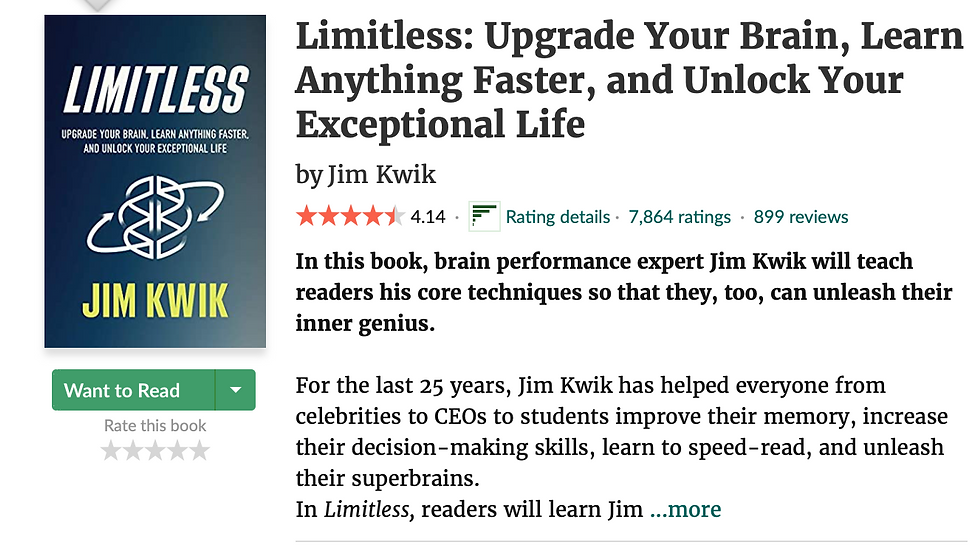Brain Training
- Admin
- Sep 13, 2021
- 4 min read
Updated: Jun 1, 2023

We have learned that one of the key risk factors for dementia is a lower level of education received early on in life. Put another way, the more education we had in childhood, the more likely it is that we will have more intellectual reserve to draw upon in the face of neurodegenerative processes.
Digital Dementia
I’m old enough to remember not being allowed to bring a calculator into standardized tests like the SATs. And while I appreciate all the conveniences afforded by technology, I am also grateful to have grown up in an era when we still had to memorize phone numbers and find our way around without GPS. I can still remember some of those numbers now, and they come in handy when creating passwords.

In his book Limitless, Jim Kwik uses the term Digital Dementia, as coined by neuroscientist Manfred Spitzer, to describe how we are collectively losing the ability to remember things because of over reliance on digital technology. Our short-term memory pathways can atrophy due to underuse, just as our muscles will weaken and waste away when we don’t use them.
Dr Maria Wimber notes that our memories are strengthened when we repeatedly recall things, whereas irrelevant information is constantly being eliminated. So when we don’t make an effort to remember things because we know that we can just look them up, we may actually be weakening recall mechanisms in the brain.
Brain Training
Whether technology helps or harms our brains is still a highly controversial topic within research circles, but if we want to maximize brain function it makes sense to be proactive in training it. So how exactly do we go about training the brain? There are a number of apps and websites that claim to train the brain through games and exercises that target memory, focus, processing speed and so on.
While I have had fun playing with the app Lumosity, I prefer to engage my brain by using it to help me in my everyday work and life. For example, I have found it tremendously helpful to memorize my credit card number so that I can enter it for online purchases without having to go to my purse to reference it every time.

Exercise and movement of any kind has been strongly correlated with preservation of brain function, but certain sports like table tennis have been shown to be particularly beneficial because they combine aerobic fitness with mental challenge. Dr Wendy Suzuki at NYU postulates that this is due to the demands of the sport, including fine motor control and hand-eye coordination, as well as anticipatory analysis and problem solving while rapidly assessing the speed and spin of the ball.
Mental discipline
There are myriad ways to train the brain to improve memory, attention, and cognitive functions. I have found that it is easier to engage in such training when I make it fun and easy for myself.
As a child I loved reading - I would voraciously consume any books that came my way. My mother loved novels, too, but she taught me that reading was a pleasure to be indulged in only after the work was finished. During my adolescence, books also became an escape from the discomfort of parental discord.

In college, I found reading to be my procrastination activity of choice, and I would put myself on a strict diet of no fiction reading during exam times. This “fiction fast” lasted throughout much of medical school and residency, as I turned to more virtuous reading of nonfiction self-help and parenting books.
And then I found myself listening to audible books and podcasts rather than reading, so that I could train for triathlons and distance running events while learning. While listening to books was fun and easy, it was a technology shortcut that was passive and somehow lacked something.
Just do it
I rediscovered my love of children’s literature when reading to my own kids. We share many happy memories of me doing the different voices of Harry Potter characters with British accents as I read to them. Turns out reading is one of the easiest and most important ways to train our brains.

And so is creating art. Or playing a musical instrument. Or learning just about any new skill, whether it’s gardening or cooking or speaking Italian. What the brain needs is new challenges and stimulation. Like my aerobic capacity or muscle strength and flexibility, I get to use my brain’s remarkable functions or lose them with disuse,
So I’d encourage you to inventory what you are already doing to train your brain to keep it fit. Perhaps it’s part of your daily work activities already. Just becoming aware of the hazards of technology is the first step to figuring out how we want to use it to enhance our lives. We can choose to strengthen our brains instead of allowing them to grow flabby with disuse and engorged with the junk food of our internet feeds.

Resources:
Brain supercoach Dr Jim Kwik uses simple and accessible tools to teach important training techniques like speedreading, memory, executive function and reasoning. His writing style is engaging and entertaining, as well as highly informative.





Comments